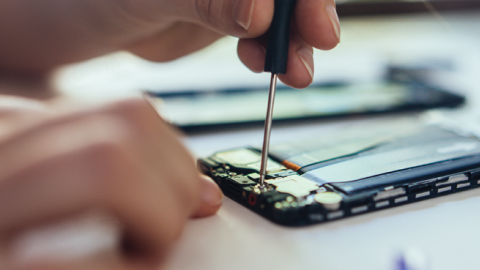Executive Summary
Various states are considering laws that would mandate that producers of electronic devices provide consumers and repair shops with all the tools and know-how necessary to repair these devices. Proponents of these “right-to-repair laws” argue that consumers should be able to do whatever they want with their devices, whether a smartphone, a smart TV, or a gaming console. Right-to-repair advocates, however, ignore inconvenient facts. These state laws conflict with federal copyright law and are unconstitutional, and they are bad policy as well.
First, as a simple legal matter, the proposed right-to-repair laws are unconstitutional. These laws mandate the disclosure and distribution of the code in the computer programs that make our devices work, such as operating systems, apps, and the “digital locks” that protect these computer programs from unauthorized access and copying. Federal copyright law protects all these computer programs and “preempts” any conflicting state laws under the Constitution.
Second, state right-to-repair laws are wrong as a matter of policy. These laws upset the long-standing balance of rights implemented by federal copyright law. For over 200 years, Congress has enacted copyright laws to secure to authors and innovators the fruits of their creative labors. These laws have properly balanced the rights of creators, the rights of companies that produce and distribute their copyrighted works, and the rights of consumers and the public. As a result, federal copyright law has been a launching pad for the economic and cultural revolutions in books, movies, music, and now digital games and the internet of things.
Everyone values their electronic devices because copyright law provides the legal foundation for today’s thriving digital marketplace. Consumers have access to an incredible selection of movies, music, games, and many other previously unimagined digital goods and services. The same is true for products that consumers have long used and that have become “smart” today, such as phones, TVs, automobiles, and other devices. Overbroad right-to-repair laws fail to acknowledge the legal rights and the underlying policies in federal copyright law that have made all this possible.
Key Takeaways:
- Federal copyright law has long protected the respective rights of creators, innovators, consumers, and the public.
- State right-to-repair laws are unconstitutional because they directly conflict with the careful and time-tested balance of rights in federal copyright law.
- The unprecedented success of the modern digital marketplace and the explosion of “smart” devices today confirm the policy merits and economic value of federal copyright law.
- States should not waste scarce resources by enacting overbroad right-to-repair laws that are unconstitutional and are bad policy.



















